Historical narrative, pages 1-5. |
pages 6-10; |
IMAGE pg. 1
|
THE OLD TIME FIREMAN
Through night and day, in sunshine and in rain,
He answered then the warning bell's refrain
Those good old days will mever come again
When he ran with the old machine!
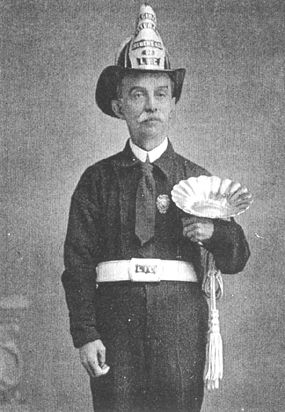 WM. H. GIBSON President Veteran Firmen's Association 1891
WM. H. GIBSON President Veteran Firmen's Association 1891
|
LOOKING BACKWARD.
It has always been a source of wonder and admiration with the public, how it is that the Old Firemen continue to maintain that esprit de corps so noted in the days of the late
Volunteer Fire Department, so entirely their own and unknown in other bodies; it is a fact and difficult to explain, for they certainly do retain a warm place in the hearts of the country which time appears rather to increase than diminish.
It can, however, in a measure, be accounted for as follows:
Since its earliest days the Volunteer Fire Department has embraced among its members the very best classes of our citizens, and to-day they can be found throughout the walks of life of the entire world, still cherishing the same fraternal feeling for their old institution.
Ministers to Foreign Countries, judges, Mayors, prominent officials of
all kinds, have once been Volunteer Firemen; their Exempt Certificates, occupy a
prominent place in their homes, and cherished as proud mementos of the stirring
and hazardous days of a Fireman, so fraught with danger as to be
almost a fascination.
There can be no question in these days that the work of the Volunteer
Firemen in the past is becoming better
appreciated as the years pass by. This recognition of their true worth has
come somewhat late, it is true, but we,
who are survivors of many a hard-fought battle to save life and property,
feel glad that it has come.
|
Narrative, page 2
[IMAGE pg. 2]
|
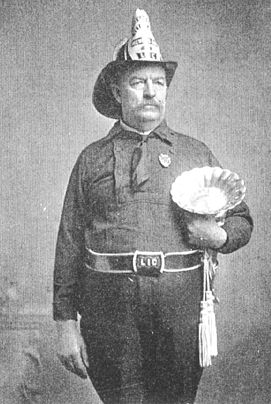 OWEN F. WOODS President Veteran Firemen's Association 1892
OWEN F. WOODS President Veteran Firemen's Association 1892
|
Our only regret at this time, while celebrating the Twenty-Fifth Anniversary of our
Association, is that those of our
comrades who have answered the final roll call cannot be with us on this occasion.
But their memory remains enshrined in our hearts, and their good deeds, their
loyalty and their grand manhood will never be forgotten.
GEORGE WASHINGTON AS AN ACTIVE FIREMAN.
The History of the rise and progress of New York, will be borne
out by the facts we present. We will bring to light, among other important
things, one interesting fact that had been
forgotten or not generally known--the fact that the Father of his Country had enrolled
himself as a Volunteer Fireman.
George Washington, who was as zealous in the discharge of his duty as a private citizen
as he was eminent and efficient in public life, became an active fireman in Alexandria,
Virginia, about the year 1750. He was then but eighteen years of age, and resided
with his brother Lawrence at Mount Vernon, several miles from town, which lie visited
"on horseback as often as ten times a week."
As a young man he took an active part in all the affairs of the growing place until
it became an important colonial city.
Besides his firmness of character, his love of active pursuits, his passion for
horsemanship and all manly sports made him a
natural leader among the young men of the town. It is related that he was always
one of the foremost to assist in putting out fires, riding even from Mount Vernon
to be present at one. As Alexandria increased in size, the principal
citizens began to organize for protection against fire, and the town
record 'shows that they each agreed, out of "mutual friendship" to carry to
every fire "two leathern buckets and one great bag of oznaburg or wider linnen."
This was the primitive colonial mode of extinguishing flames.
The watchmen were also enrolled as firemen, and sounded an alarm by sending
forth a blast from a huge trumpet which they wore slung
|
Narrative, page 3
[IMAGE pg. 3]
|
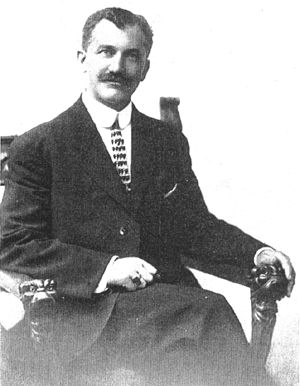 P. A. LEININGER President Veteran Firemen's Association 1893
P. A. LEININGER President Veteran Firemen's Association 1893
|
about their shoulders. Instead of billies they carried quaint-looking weapons
called spontoons, something between a spear and a halberd. These antique weapons
were left behind in store at Alexandria by General Braddock's troops in
1755, when they marched on their disastrous expedition to the West.
The spontoons were appropriated by the municipal authorities, and, strange to say,
were still in use by the watchmen when the provost guard of a Michigan
regiment, in the summer of 1861, relieved these obsolete guardians from further duty.
The Friendship Fire Company of Alexandria was organized in 1774.
At that time Washington was a delegate to the
Continental Congress in Philadelphia, but the members of the new company
evidently remembered his former services as fireman, for at one of their first
meetings they unanimously elected him an honorary member, and forwarded him
a copy of the minutes. To show his appreciation of the compliment, he at once made
a thorough inspection of the different kind of fire engines in use in
Philadelphia, and upon his second return there, in 1775,
he bought from one Gibbs, a small fourth-class engine, for
eighty pounds and ten shillings and just before he set out for
Boston to become Commander-in-Chief of the Continental Army,
he sent this little engine as a present to the Friendship Fire Company
The great Chieftain did not lose his interest in fire matters through
his elevation to position and power. Upon his retirement to Mount Vernon,
after his second term as President, and when his fame had spread round
the world, he continued to take an active interest in the municipal affairs of
Alexandria. It is related that in the last year of his life he was one day riding down
King Street, when a fire broke out near the market. He was accompanied by his servant, also on horseback, and noticed that Friendship Company engine was poorly manned though a crowd of well-dressed idlers stood about.
Riding tip to the crowd he employed very vigorous language in rebuking
their indifference at such a time. He ended by calling out,
"It is your business to lead in these matters" and throwing the bridle
|
Narrative, page 4
[IMAGE pg. 4]
|
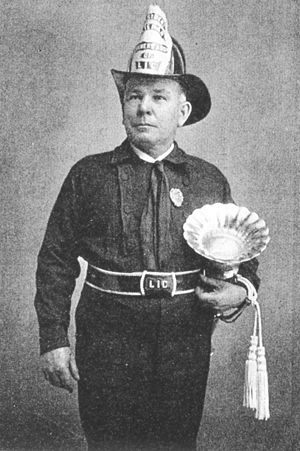 PETER S. DONNELLY President Veteran Firemen's Association 1894
PETER S. DONNELLY President Veteran Firemen's Association 1894
|
of his horse to his servant, he leaped off and seized the brakes,
followed by a crowd that gave the engine such a
"shaking up" as it never knew afterwards.
HISTORY OF ASSOCIATION.
The Veteran Firemen's Association is almost entirely made up of men who were identified
with the volunteer companies that were located in Astoria, although there is now
an honorary roll cornposed of prominent business men and residents.
ORGANIZATION Or The ASSOCIATION.
On January 20, 1890 a meeting was held at Casey's Hall,
157 Fulton Avenue, Astoria, composed of those who had served their
time in the Volunteer Fire Department of Long Island City.
The object of the gathering was to discuss the advisability of forming
a Veteran Association. The meeting was largely attended and the project met with
enthusiastic approval. George Casey acted as Chairman and
A. C. Woods as Secretary. A committee was appointed to secure a charter,
and it consisted of Thomas J. Murphy, B. J. McGowan, William N.
Mason, James H. Kelly and George Chown.
It was decided at this meeting that the new organization should
be known as the VETERAN FIREMEN'S ASSOCIATION or LONG ISLAND CITY.
At a subsequent meeting February 5, 1890, seven members were appointed
to act as incorporators. The committee comprised William Y. Mason,
Michael J. Reidy, William N. Mason, John E. Healy, James M. Rage, Matthew E.
Kelly, Thomas J. Murphy. Only four members of this committee are alive today.
The application for a charter was made before justice Willard Bartlett in the
Second District Supreme Court, and was promptly granted. The committee of
incorporation signed the papers, as incorporators, together with Charles Heiser
and Britton H. Tompson The
|
Narrative, page 5
[IMAGE pg. 5]
|
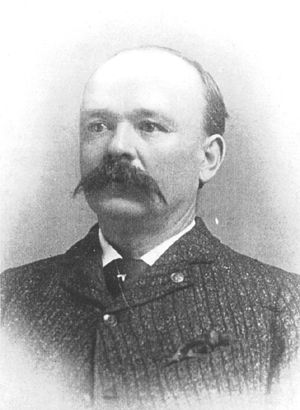 B. J. McGowan President Veteran Firemen's Association 1898
B. J. McGowan President Veteran Firemen's Association 1898
|
official documents were signed, sealed and delivered on March 20, 1890.
FIRST OFFICERS ELECTED
The first regular meeting of the new association was held on April 14, 1890
when the following officers were elected:
George Casey, President; A. C. Woods, First Vice-President; P. S. Donnelly,
Second Vice-President; F. W.
Umschlag, Financial Secretary; M. J. Reidy, Recording Secretary;
Fred T. Hallett, Treasurer; John McNamara, Sergeant-at-Arms.
A committee on by-laws was appointed consisting of Thomas J. Murphy,
James Y. Foley, John Code, William Y. Mason and F. W. Unschlag.
A constitution and by-laws were adopted May 26, 1890
PROGRESS OF ASSOCIATION.
The early history of the Veterans was indeed most interesting. For nine years we
struggled hard for existence, paying the funeral expenses of deceased members by personal
assessments levied against the living members of the organization and contributing
as far as our limited means would permit to the relief of the distressed widows and
orphans of those of our members who had answered the last roll call.
But as the years progressed the financial condition of the Veterans' organization
became greatly improved, and we were enabled to purchase two lots on Grand Avenue
where we erected a plain and unpretentious building which now serves as a
headquarters and in which is stored many valuable and interesting
relics of the "old days" when the "boys" were ready at any time of day
or night to respond to alarms for the protection of life and property.
There was no thought of reward or pay in our ranks for the dangers we incurred.
We were content with the knowledge of duty well and faithfully performed.
The Association held forth at No. 165 Fulton Avenue in rented quarters
until March 26, 1907, at which date we vacated our old quarters
continued
|
|